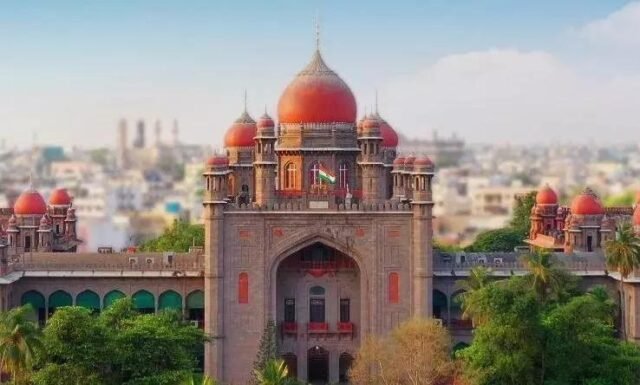Hyderabad:A two-judge panel of the Telangana High Court refused to interfere with an order of a single judge who had dismissed a writ plea challenging the deletion of the name of a sexagenarian woman from land revenue records allegedly without due notice or procedure. The panel comprising acting Chief Justice Sujoy Paul and Justice Renuka Yara was dealing with a writ appeal filed by Pathula Padmamma. The appellant claimed ownership of over 14 acres of land in Kothapally, Mahbubnagar district, and alleged that her name was arbitrarily removed from official records in collusion with unofficial respondents. It was argued before the single judge that the land was sold to them by the petitioner’s late husband under a sada bainama (unregistered sale deed) validated in 2006, following which their names were rightly mutated in revenue records. While the petitioner sought redress under the Telangana Rights in Land and Pattadar Passbooks Act, 2020, the authorities rejected her claims and advised her to approach the civil court. The single judge, upholding the administrative orders, found no procedural irregularities or illegality. The single judge noted that complex questions surrounding the genuineness of sale transactions required adjudication through civil proceedings, not through a writ petition. The petitioner was granted liberty to pursue the matter in a civil court. The appellant contended before the panel that if there was a violation of principles of natural justice, a writ petition is maintainable even though an alternative remedy was available. The panel rejected the argument and ruled that there was no plea from the appellant that if she is relegated to avail of the statutory remedy, she may be subjected to palpable prejudice. The panel accordingly dismissed the writ appeal and left it open for the appellant to pursue remedies available to her.
HC takes up plea on defamatory videos
The Telangana High Court will decide a writ plea against the circulation of allegedly defamatory and inflammatory videos on social media platforms by Signature Studios allegedly targeting a woman politician. Justice T. Vinod Kumar took on file a writ petition filed by Hanumandla Jhansi Reddy, who sought directions to the authorities to take prompt and effective action against Uppender Singh Nayak, a reporter associated with Signature Studios, as well as Google and other respondents. The petitioner accused them of sharing and circulating content that was derogatory, scandalous, and capable of inciting hatred and enmity between rival groups. In the petition, it was alleged that despite making several representations, the authorities had failed to act against those responsible for circulating the objectionable videos. The petitioner contended that such inaction was illegal, arbitrary, discriminatory and violated her fundamental rights guaranteed under the Constitution of India. It was further submitted that the content being circulated not only defamed the petitioner but also posed a grave threat to public order by potentially provoking communal or inter-group tensions. The petitioner alleged that the videos were deliberately created and disseminated to tarnish her public image and endanger her personal safety and dignity. Seeking urgent relief, the petitioner requested the court to issue directions to initiate stringent legal action against the respondents and to ensure the immediate removal of the offending videos from all social media platforms. The judge, after taking the matter on file, directed that it be placed before a different bench holding the roster to deal with such cases.
HC rejects GVK EMRI review petition
Justice Surepalli Nanda of the Telangana High Court dismissed a review petition filed by GVK EMRI, challenging an earlier order directing the reinstatement of 187 emergency workers whose services were terminated in August 2018. The writ petition was filed by the Telangana State 108 Employees Union, which contended that the termination of emergency medical technicians, ambulance drivers and emergency response officers, many with over a decade of service, was arbitrary and in violation of constitutional and labour rights. The union alleged that the dismissals followed demands to reduce working hours from 12 to eight and were communicated informally via WhatsApp in August 2018, in breach of due process. Justice Nanda had in July 2023 ruled in favour of the union, directing GVK EMRI to consider reinstatement of the remaining 187 employees from the 947 who were dismissed and to take a decision within eight weeks, relying on Supreme Court precedents affirming employment rights of contract workers. In the review petition, GVK EMRI, a private agency managing the state’s 108 ambulance services, sought reconsideration of the 2023 ruling. The judge found no merit, observing that review jurisdiction is confined to correcting errors apparent on the face of the record, and no such error was shown. The judge held that the grounds raised were repetitive of those already adjudicated and reiterated that the termination violated principles of natural justice and constitutional safeguards. The judge also referred to the Bonded Labour System (Abolition) Act and the Contract Labour (Regulation and Abolition) Act, noting that long-serving workers in essential emergency health services cannot be removed arbitrarily.
HC rebukes authorities over clinic demolition
Justice K. Lakshman of the Telangana High Court came down heavily on the Warangal district collector and other respondent authorities for carrying out a demolition without following due process. The judge directed the commissioner of the Greater Warangal Municipal Corporation (GWMC) to conduct an inquiry into the demolition of a private clinic and compound wall in violation of the Land Acquisition Act, 2013. The judge was hearing a writ petition filed by Dr G. Venkateshwara Sarma, challenging the actions of the municipal authorities, who allegedly marked and partially demolished portions of his clinic building located on MG Road, near Gopala Swamy temple, Warangal. The demolition was reportedly executed as part of a project to widen the road from 80 feet to 100 feet. The petitioner contended that the demolition was executed without initiating proceedings under the Right to Fair Compensation and Transparency in Land Acquisition, Rehabilitation and Resettlement Act, 2013 (Act 30 of 2013) and without payment of compensation, thereby violating Article 300-A of the Constitution of India. It was further submitted that the demolition was contrary to a prior notice issued by the deputy commissioner, Kasibugga, which had not authorised such action. After considering the submissions, the judge disposed of the writ petition with a direction to the commissioner, Greater Warangal Municipal Corporation, to consider the representation and take necessary action. The judge further directed the commissioner to inspect the site, conduct an appropriate inquiry, and pass reasoned orders strictly in accordance with the law within six weeks.






